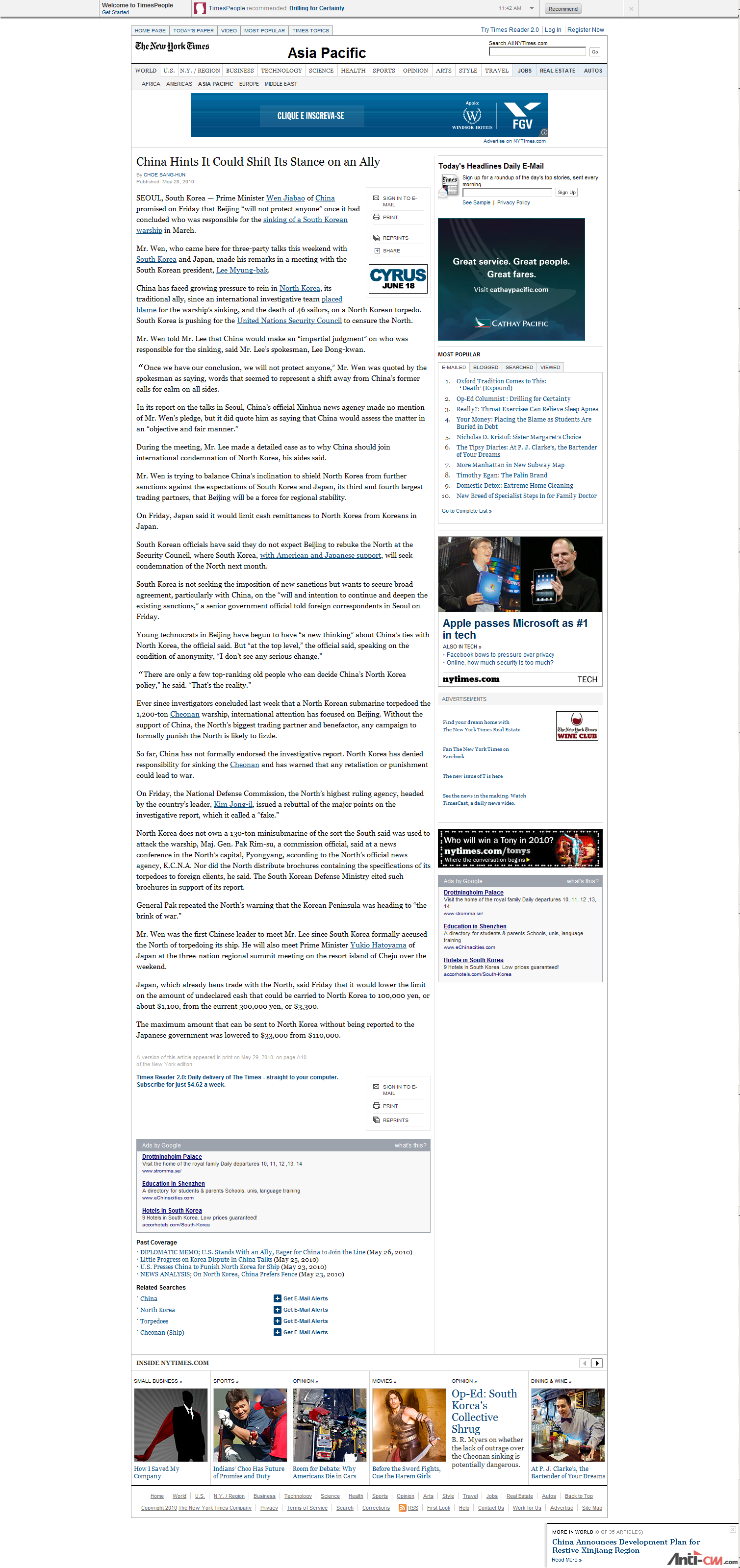|
|
本帖最后由 千年明月 于 2010-6-12 17:06 编辑
原文链接:http://www.nytimes.com/2010/05/29/world/asia/29korea.html?ref=world
China Hints It Could Shift Its Stance on an Ally
SEOUL, South Korea — Prime Minister Wen Jiabao of China promised on Friday that Beijing “will not protect anyone” once it had concluded who was responsible for the sinking of a South Korean warship in March.
Mr. Wen, who came here for three-party talks this weekend with South Korea and Japan, made his remarks in a meeting with the South Korean president, Lee Myung-bak.
China has faced growing pressure to rein in North Korea, its traditional ally, since an international investigative team placed blame for the warship’s sinking, and the death of 46 sailors, on a North Korean torpedo. South Korea is pushing for the United Nations Security Council to censure the North.
Mr. Wen told Mr. Lee that China would make an “impartial judgment” on who was responsible for the sinking, said Mr. Lee’s spokesman, Lee Dong-kwan.
“Once we have our conclusion, we will not protect anyone,” Mr. Wen was quoted by the spokesman as saying, words that seemed to represent a shift away from China’s former calls for calm on all sides.
In its report on the talks in Seoul, China’s official Xinhua news agency made no mention of Mr. Wen’s pledge, but it did quote him as saying that China would assess the matter in an “objective and fair manner.”
During the meeting, Mr. Lee made a detailed case as to why China should join international condemnation of North Korea, his aides said.
Mr. Wen is trying to balance China’s inclination to shield North Korea from further sanctions against the expectations of South Korea and Japan, its third and fourth largest trading partners, that Beijing will be a force for regional stability.
On Friday, Japan said it would limit cash remittances to North Korea from Koreans in Japan.
South Korean officials have said they do not expect Beijing to rebuke the North at the Security Council, where South Korea, with American and Japanese support, will seek condemnation of the North next month.
South Korea is not seeking the imposition of new sanctions but wants to secure broad agreement, particularly with China, on the “will and intention to continue and deepen the existing sanctions,” a senior government official told foreign correspondents in Seoul on Friday.
Young technocrats in Beijing have begun to have “a new thinking” about China’s ties with North Korea, the official said. But “at the top level,” the official said, speaking on the condition of anonymity, “I don’t see any serious change.”
“There are only a few top-ranking old people who can decide China’s North Korea policy,” he said. “That’s the reality.”
Ever since investigators concluded last week that a North Korean submarine torpedoed the 1,200-ton Cheonan warship, international attention has focused on Beijing. Without the support of China, the North’s biggest trading partner and benefactor, any campaign to formally punish the North is likely to fizzle.
So far, China has not formally endorsed the investigative report. North Korea has denied responsibility for sinking the Cheonan and has warned that any retaliation or punishment could lead to war.
On Friday, the National Defense Commission, the North’s highest ruling agency, headed by the country’s leader, Kim Jong-il, issued a rebuttal of the major points on the investigative report, which it called a “fake.”
North Korea does not own a 130-ton minisubmarine of the sort the South said was used to attack the warship, Maj. Gen. Pak Rim-su, a commission official, said at a news conference in the North’s capital, Pyongyang, according to the North’s official news agency, K.C.N.A. Nor did the North distribute brochures containing the specifications of its torpedoes to foreign clients, he said. The South Korean Defense Ministry cited such brochures in support of its report.
General Pak repeated the North’s warning that the Korean Peninsula was heading to “the brink of war.”
Mr. Wen was the first Chinese leader to meet Mr. Lee since South Korea formally accused the North of torpedoing its ship. He will also meet Prime Minister Yukio Hatoyama of Japan at the three-nation regional summit meeting on the resort island of Cheju over the weekend.
Japan, which already bans trade with the North, said Friday that it would lower the limit on the amount of undeclared cash that could be carried to North Korea to 100,000 yen, or about $1,100, from the current 300,000 yen, or $3,300.
The maximum amount that can be sent to North Korea without being reported to the Japanese government was lowered to $33,000 from $110,000.

|
Ally, Its, Shift, stance, 纽约时报, Ally, Its, Shift, stance, 纽约时报, Ally, Its, Shift, stance, 纽约时报
|